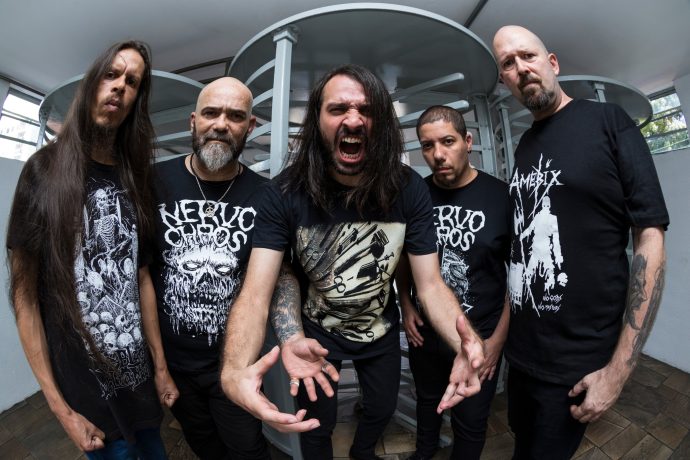
(In March of this year Emanzipation Productions released a new album by the long-running Brazilian death metal band Nervochaos, and more recently our Norway-based interviewer Karina Noctum was able to catch up with the band’s drummer Eduardo Lane to discuss the album and many other topics in the interview we now present.)
Nervochaos released their latest album Chthonic Wrath back in late March and then embarked on a European tour with their fierce discharge of Death and Thrash metal.
I interviewed Eduardo Lane (Drums) and we talked not only about their latest release and touring, but also we touched on the topic of the Brazilian contribution to black metal since they were visiting Oslo.
******
How do you think Nervochaos continues developing the Brazilian metal sound?
I think we are not very concerned on re-inventing the wheel more than on having the wheel turning, you know. So we are, of course, a hard-working band. We try to do our own thing. We have a blend of thrash, death, and black metal lyrics here and there. You know, and I think we’ve done good. I mean, the band is 27 years old. And we keep touring and touring. And slowly, we’re getting a better fan base, some recognition. And this is success for us, you know. Being active and being able to tour and record albums, this is what we are all about.
So I’m happy, and I think we still have the fire and the passion, which is the most important thing, in my opinion. We are a passionate band, you know, and we love what we do.
I don’t see music as a competition. I think of it as art and people have different ways to express themselves. I think we’re trying to do our own thing. Of course, we have many influences, mainly from old Brazilian bands, and of course some North American bands, some European bands here and there. But we tried to not copycat other stuff, we tried to develop our own sound and I think we’re doing good. I mean, I’m happy. You know, it’s hard to say when you’re inside the hurricane.
Which bands have influenced you?
I’m very influenced by the early Sepultura stuff, of course, because I grew up listening to ’80s Brazilian metal in general. Bands like Sarcófago, Sepultura, Chakal, Holocausto, MX and Mutilator. So, I’m very influenced by that. And of course, bands like Slayer, Judas Priest, Motörhead, and Venom.
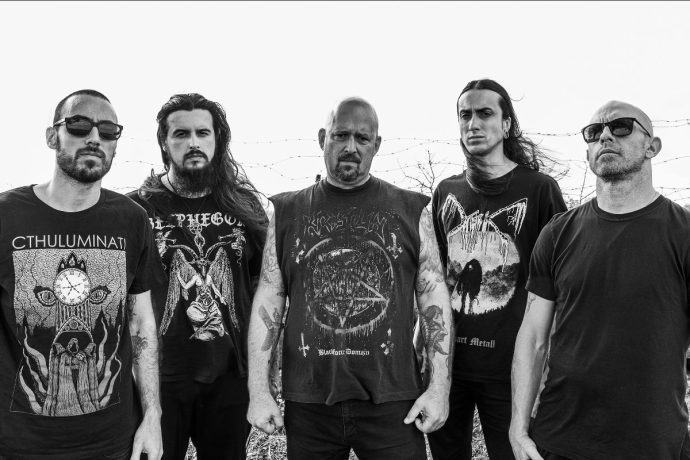
I think Brazil is probably the most successful metal scene in South America. Like, you have several big names there…
I agree. I mean, I see the US and UK like the mother and father of the whole thing of course. When it comes to Brazil, I think there are so many fucked up things happening in the country that it’s like a fuel to the people to be pissed off and try to do some good art. So the more miserable our lives are, the better the music that comes from it, I think. And for some reason, Brazil has been very metal since the early ’80s. I love just being part of it. There are so many killer bands not only in Brazil, but if you think of the rest of South America as well, you know — Colombia, Chile, Peru. I think South America is a cradle for good metal music in general.
You know, Masacre from Colombia came here to Inferno and they gave a conference about people from Medellin tape trading with Norwegian black metal musicians. This also happened in many other countries. Do you know anything about this topic when it comes to Brazil?
Yeah, I was lucky enough to meet the Sepultura guys in ’87, and go to Max and Igor’s house. They were showing me letters that they were exchanging with men from Norway and Germany. You know from many iconic bands, and it was mind-blowing. I mean for us you know, it was awesome that Brazilian bands could talk to those guys and then later on they could start going to Europe and the US.
For me Sepultura are the ones that really put the Brazilian metal scene on the map and showed that we also have other things besides football and carnival. They were the pioneers, they are legends, and I totally respect the legacy and everything they did for the scene, even though I don’t really like their newer music.
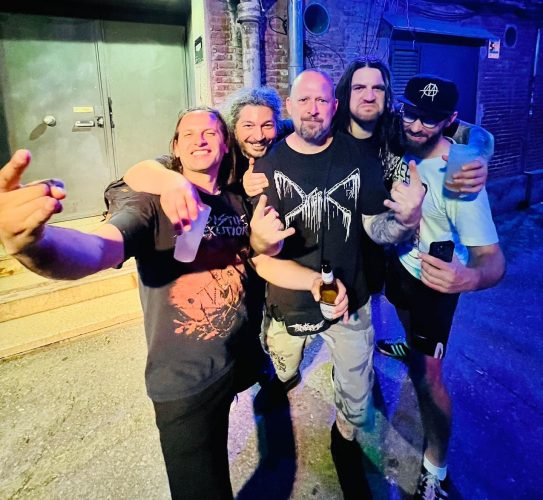
In the controversial book Lords of Chaos, it is written that Sarcófago inspired early black metal corpsepaint. What do you think about it?
I totally agree. I had a discussion with some Norwegian friends I have from bands. And some of them do agree with me that Sarcófago were one of the pioneers that influenced a lot of the first wave black metal. Not only Sarcófago, but of course Bathory, Celtic Frost, and Venom. But I think Sarcófago were very ahead of their time with the first album, especially I.N.R.I., you know, with the whole corpsepaint and blast beats. A lot of people don’t give them credit for that. But I do think they are one of the pillars of the black metal movement.
So you have toured in several countries around the world. What are your best or worst touring experiences?
It’s hard to say because every show in every tour is special in its own way. And for me being able to tour and be on stage is a dream come true. I’m very thankful every day I wake up and I can go and do another concert. So they’re all very special to me. Always. So it doesn’t matter where I am. And every country, every city, every show is important. You know, everybody who attends the show is important. It doesn’t matter if it’s 10 people or 10,000. We try to give everything we have because we love what we do.
Of course, there’s ups and downs, but I prefer to live in a rollercoaster than in a merry-go-round, you know. I think the worst I can remember right now is getting arrested in Bangladesh. That was a really scary, shitty moment.
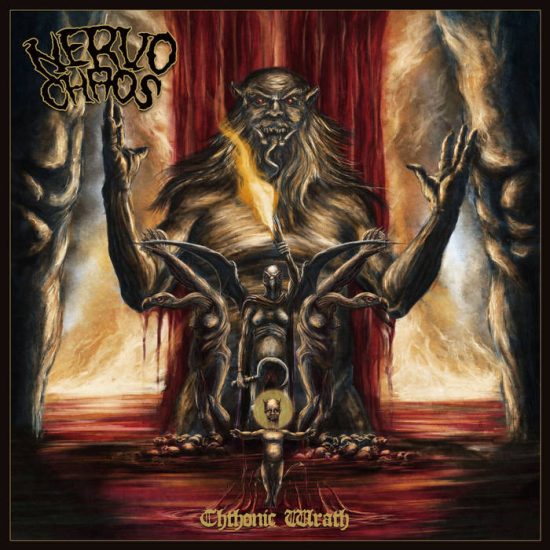
Please tell us about the process of making Chthonic Wrath…
We did this album during the COVID thing you know. We recorded actually four albums during that period of two years. Chthonic Wrath is kind of a continuation from All Colors of Darkness, which we released last year. And we wanted to do a very straightforward and short album because Ablaze, for example, is a very long album with 16 songs and intros and all that. With Chthonic we were not so worried about being fast or anything, but we wanted to bring all the influences back, some heavy metal, some speed metal, some thrash parts, some some old school death metal. I think there’s a good blend of tempo changes, and I’m very happy with the album itself.
It’s always hard to try to invent yourself and evolve as a band. We don’t want to be repetitive, you know, all the time. But that’s a task we have for all the albums, trying to put out new music and to continue touring. It’s a necessary evil. We try to do what we love, first of all. If people like it, great; if people don’t, I’m sorry. We still love what we do; we believe in what we do.
So I think Chthonic Wrath is an evolution from everything we’ve been doing. The band is more mature, if you compare it to the older albums we have, and I’m very happy with the path we are heading towards. And this blend of thrash, death, with some dark lyrics and some evil stuff, and I like it. We’re experimenting, and we are what we are, we don’t pretend to be what we’re not, you know, and this is, I think, a cool thing.
There’s no studio tricks or anything, you know. We record without click, we don’t do sound replacements, we tried to do it the old school way, you know, rehearse very hard, and then just go into the studio and do it. I think that’s the spirit in the end, to keep the flame burning and do what you love being passionate about it, and it is what it is.
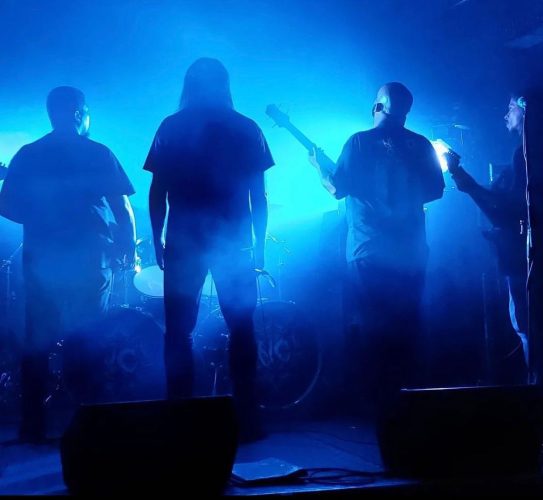
How has Chthonic Wrath been received by the audience?
I’m happy the album came out earlier this year. And this is the tour we’re doing for the whole year. We try to blend songs from all the albums in our show, you know, at least one song from each album. We do have more songs from Chthonic Wrath rehearsed and we are ready to play, and whenever we have more time on stage, we will play them live and see how people are going to react and stuff. You know, sometimes you like a song, but then they don’t work as good live or people don’t like it as much. So you try different songs, you’ll switch here, switch there, until you find that song people seem to like more than the other. So it’s hard to choose, because mainly it is the crowd that kind of chooses.
But we don’t do this to please everybody. First of all we do it to please ourselves and if it pleases people, even better, you know, and if not, we are gonna try again with another album. And we tried to reinvent ourselves without losing our purpose, our goals.
So you have your own studio, right?
Yeah, we do have our own. We built a studio after many years, and it got ready in early 2020. And luckily, it was by the time COVID struck that we had the studio. So we could really focus on the studio. We love to play, you know. So for us, it’s a pleasure to jam and to rehearse. And then we had the time because we couldn’t tour so we started working on a new album and new songs. And when we saw we had so many songs that we said, fuck it, let’s record albums, you know? So that’s what we did. And we’re happy we work with the same producer, and with the same guy who did the artwork, for example. So we tried to have this continuation on all the albums and everything. So, yeah, I mean, we’re happy.
In a way we survived, as I said, and we were lucky enough to have our own studio. So we were able to do what we did. I know a lot of bands couldn’t really do anything. And it was a very dark period, because our income comes from shows, and not from selling albums, you know. And so luckily, we had saved some money, so we could use that money and having your own studio you don’t spend money to record or nothing. So I think we’re lucky in the end to have our own place to do that.
So how did the production go since the producer lives in the US?
Now, we wanted to record in California, but then COVID came. We sent the recordings to Brandon, who did the mixing and the mastering for those albums. We just sent it through the internet, and he did what he had to do. We were very happy to work with him. You know, he has worked with several Brazilian metal bands and different artists as well. But we recorded with Adassi, who is a Brazilian based in California, but he flew to Brazil, and stayed with us in the studio.
What’s the concept behind Chthonic Wrath‘s artwork?
It’s based on Greek mythology. It’s about the story of Chronos killing his father, because they were cast in hell by his father. His father was jealous of them. So cast them in hell. So the cover is Chronos after cutting his dad’s neck off with the scythe, and his dad’s blood gave birth to the Furies who represent wrath, hatred and death. Nestor, the Mexican guy who did the cover, understood the whole concept. Chthonic means the underground or hell, or those gods there in the underworld against the gods in the Olympus. That’s the whole concept of the album.
So you also arrange Setembro Negro, which has become one of the best underground metal festivals in South America, in my opinion. I’ve seen it developing through the years. How hard has it been to start up the festival in South America and bring all the international bands there?
It is super hard. I mean, I started back in ’96 as a promoter. And I started because I was pissed off, I couldn’t see the bands I wanted to see. Only the big names were going to Brazil, and Brazil was not on the map. So I decided to do something for Brazil, for our scene, you know, being able to live in the US for a couple of years and travel around the world for a couple of years, I learned a lot. And I’ve seen a lot. So I tried to bring those concepts to Brazil.
I got in contact with Sepultura and Krisiun, and they helped introduce me to bands, then I started doing shows. And looking back now I’m very happy because I actually achieved the goal of putting Brazil on the map, and we have a scene there where bands can tour inside Brazil, not only international bands, but Brazilian bands as well. There are many other promoters now, agencies, so the goal was achieved.
I kind of stopped for five years, because I had to reinvent myself, you know, and I decided to come back in 2018. And one of the things I wanted to bring back was the festival Setembro Negro, but with a slightly different concept, because earlier I was working with death and black metal bands. In 2018 I opened a little bit more and brought other styles of metal to attract more people. All without changing the whole concept of being underground, you know — for me underground is a lifestyle. I don’t have sponsors, I don’t have anybody. I do the festival by myself, you know, all the logistics and everything, it’s a lot of work.
But again, I’m for passion, not for fashion, so I just do it because I want the best for everybody. You know, for Brazil, for our scene, for the underground upcoming bands that are not known there and have the chance to go and get to start building their fan base. Get the ball rolling for everybody, and keep the flame burning. That’s the main concept of metal in my opinion, to help each other, it’s like DIY. That’s my school. That’s the school I grew up with, you know, since the tape trading and booking yourself and everything else, distros, putting together booths and shows to sell underground stuff, merch, CDs, fanzines, and all that. And I tried to keep that spirit alive and that flame alive. You know, so money is important, but it’s not about the money. It’s about the passion for metal and to keep the fire burning and to keep the underground alive.
So what are your ambitions when it comes to the festival?
I don’t think we’re becoming bigger. Of course the financial side says try to make it bigger because it will be easier to pay the bills. But I have my ideals. I have my passion and I don’t want to sell out. If it comes to a point that it becomes business, I’ll probably quit because it’s just for passion. Also I try to bring in the new generation, because we need to give them a chance to keep the legacy alive, because very soon we’re dead, and then you know what’s going to happen? Sometimes you see a lot of the old guys are very closed-minded and kind of scaring the kids away. And that’s damaging the scene itself for the future, so I’m very concerned about that. What’s going to happen when those big bands die, and who’s going to keep the ball rolling, you know, so it’s up to us.
So how many times have you been here in Norway?
In Norway, this is our third time. We were lucky enough to play the first time with Pentagram from Chile here at Revolver. Then, the second time was last year where we played at Barrikaden. And now with Lucifer’s Child.
Being the third time… does it still feel special to be in Oslo with all the black metal history?
It’s always special. And it’s always different. The first time was amazing to be here, because of course all the black metal scene and everything else. And I remember when we played with Pentagram here, Frost was here watching the show. So I looked to my side and I said oh, I think I know this guy. So I came up to him and said, “are you Frost?” He’s like, “Yeah,” and I said, “fuck man, I saw you in Brazil with Satyricon,” and this and that. And he’s like, “oh, cool, cool.” I’m like, “so do you like this kind of music?” He’s like, “no I’m not really into it. But my girlfriend is you know”, and he added, “but, I really enjoyed your set. I’m not into thrash death metal, but you guys have this old school vibe, raw kind of vibe, that I enjoy”. And I was very happy and flattered to hear that from such an icon like him.
Also being a promoter for so many years, I got the chance to do tours for so many Norwegian bands. And now coming back like today, I had so many friends you know, like Thomas from Mork and Thomas from Borknagar and Sven from Nordjevel, they were here for the gig.
Tomorrow we’re going to Bergen and I’m seeing the Gorgoroth guys and maybe Carpathian Forest and Taake. So I’m very happy to see my friends. Because in the end, it’s about friendship and metal, you know, and supporting each other. And I think that’s the most amazing thing for me, the fuel that keeps me going. It’s the contact with the people and getting some chance to know a little bit about each scene and each culture and how it, and getting this whole network together. This is what makes me kind of move and keep doing what I’m doing.
Really good. So what are your future plans?
We’re going to keep on touring in Europe until the end of July. And then we will do a Latin American tour in September with Demonical and Lucifer’s Child as well. And then after that, we’re going to go to Asia with Mork. Then we’re going to do a big Brazilian tour from October to December. And we’re going to have a couple of other bands joining us: Mork, Goatburner from Finland, and a bunch of other Brazilian bands like Funeratus, Decomposed God, Test and Sodoma, so I’m very much looking forward to it.
Anything else you would like to add?
We hope to return to Europe next year. We are already in the works for late 2024. We are probably going to be releasing a new album in 2024 and keep on touring. Check our website, Facebook, Instagram, etc. Support your local scene and keep it metal!
https://orcd.co/nervo-chth
https://targetshop.dk/nervochaos
https://nervochaos.net/
https://www.facebook.com/NervoChaos/
https://www.instagram.com/nervochaos/

Awesome to read this interview. The guys in Nervochaos are really cool. I saw them many years ago, and will see them again soon on the tour of this current album. I cant believe they have 11 albums. The passion for the metal he talked about in the interview really shines thru when they are live in concert.